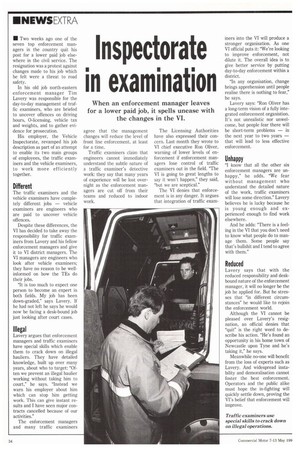Inspectorate in examination
Page 36

If you've noticed an error in this article please click here to report it so we can fix it.
When an enforcement manager leaves for a lower paid job, it spells unease with the changes in the VI.
• Two weeks ago one of the seven top enforcement managers in the country quit his post for a lower paid job elsewhere in the civil service. The resignation was a protest against changes made to his job which he felt were a threat to road safety.
In his old job north-eastern enforcement manager Tim Lavery was responsible for the day-to-day management of traffic examiners, who are briefed to uncover offences on driving hours, 0-licensing, vehicle tax and weights, and to gather evidence for prosecution.
His employer, the Vehicle Inspectorate, revamped his job description as part of an attempt to enable its two main groups of employees, the traffic examiners and the vehicle examiners, to work more efficiently together.
Different
The traffic examiners and the vehicle examiners have completely different jobs — vehicle examiners are engineers who are paid to uncover vehicle offences.
Despite these differences, the VI has decided to take away the responsibility for traffic examiners from Lavery and his fellow enforcement managers and give it to VI district managers. The VI managers are engineers who look after vehicle examiners; they have no reason to be wellinformed on how the TEs do their jobs.
"It is too much to expect one person to become an expert in both fields. My job has been down-graded," says Lavery. If he had not left he says he would now be facing a desk-bound job just looking after court cases.
Illegal
Lavery argues that enforcement managers and traffic examiners have special skills which enable them to crack down on illegal hauliers. They have detailed knowledge, built up over many years, about who to target: "Often we prevent an illegal haulier working without taking him to court," he says. "Instead we warn his employer about him which can stop him getting work. This can give instant results and I have seen major contracts cancelled because of our activities."
The enforcement managers and many traffic examiners agree that the management changes will reduce the level of front line enforcement, at least for a time.
Traffic examiners claim that engineers cannot immediately understand the subtle nature of a traffic examiner's detective work: they say that many years of experience will be lost overnight as the enforcement managers are cut off from their teams and reduced to indoor work. The Licensing Authorities have also expressed their concern. Last month they wrote to VI chief executive Ron Oliver, warning of lower levels of enforcement if enforcement managers lose control of traffic examiners out in the field. "The VI is going to great lengths to say it won't happen," they said, "but we are sceptical."
The VI denies that enforcement is in any danger. It argues that integration of traffic exam
iners into the VI will produce a stronger organisation. As one VI official puts it: "We're looking to improve enforcement, not dilute it. The overall idea is to give better service by putting day-to-day enforcement within a district.
"In any organisation, change brings apprehension until people realise there is nothing to fear," he says.
Lavery says: "Ron Oliver has a long-term vision of a fully integrated enforcement organistion. It's not unrealistic nor unwelcome, but people fear there will be short-term problems — in the next year to two years — that will lead to less effective enforcement.
Unhappy
"I know that all the other six enforcement managers are unhappy," he adds. "We fear without management who understand the detailed nature of the work, traffic examiners will lose some direction." Lavery believes he is lucky because he is young enough and experienced enough to find work elsewhere.
And he adds: "There is a feeling in the VI that you don't need to know what people do to manage them. Some people say that's bullshit and I tend to agree with them."
Reduced
Lavery says that with the reduced responsibility and deskbound nature of the enforcement manager, it will no longer he the job he applied for. But he stresses that "in different circumstances" he would like to rejoin the enforcement world.
Although the VI cannot be pleased over Lavery's resignation, an official denies that "quit" is the right word to describe his action. "He's found an opportunity in his home town of Newcastle upon Tyne and he's taking it," he says.
Meanwhile no-one will benefit from the loss of experts such as Lavery. And widespread instability and demoralisation cannot foster the best enforcement. Operators and the public alike must hope the in-fighting will quickly settle down, proving the VI's belief that enforcement will improve.




















































































































